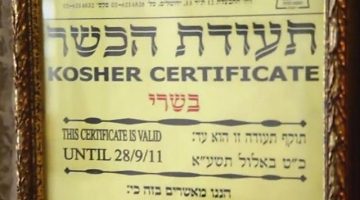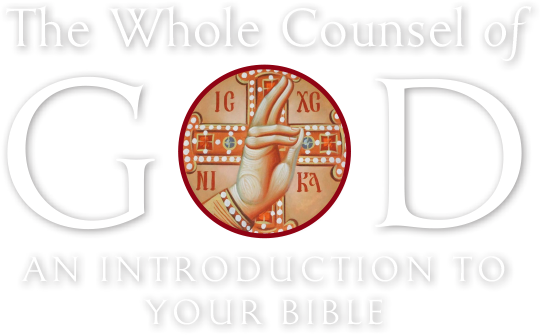 The most common answers to this question, that ‘that part’ of the Law doesn’t apply anymore, or that Acts 15 said that only four commandments apply to Christians, have been seen in previous posts in this series to not be valid from the perspective of how the New Testament understands the Law as applying to Christians. Why is it, then, that Christians do not follow the kosher laws regarding food in the Old Testament? In fact, many of the foods that Orthodox Christians in particular are allowed to eat during fast periods are food which were considered unclean under the commandments of the Law. It must first be said that there is no good evidence that the Apostles, including St. Paul, stopped following these food guidelines during their earthly lives, and there is in fact some, albeit slight, evidence that they did continue to follow them. It is very clear, however, from the New Testament, that the Apostles had come to a different understanding of cleanness and uncleanness, and this included food.
The most common answers to this question, that ‘that part’ of the Law doesn’t apply anymore, or that Acts 15 said that only four commandments apply to Christians, have been seen in previous posts in this series to not be valid from the perspective of how the New Testament understands the Law as applying to Christians. Why is it, then, that Christians do not follow the kosher laws regarding food in the Old Testament? In fact, many of the foods that Orthodox Christians in particular are allowed to eat during fast periods are food which were considered unclean under the commandments of the Law. It must first be said that there is no good evidence that the Apostles, including St. Paul, stopped following these food guidelines during their earthly lives, and there is in fact some, albeit slight, evidence that they did continue to follow them. It is very clear, however, from the New Testament, that the Apostles had come to a different understanding of cleanness and uncleanness, and this included food.
The primary passage dealing with the unclean status of animals used for food is Acts 10. In this passage, immediately before he is to be invited to the home of Cornelius, a Roman centurion and God-fearer. The thrust of this passage is to communicate to St. Peter that the Gentiles are no longer considered unclean, and that he can go into Cornelius’ home, and the Apostles in general can go to the Gentiles, without concern of becoming unclean through contact with Gentiles. For this imagery to work and this message to be communicated, however, the core principle, that God has now made these animals, and the Gentiles, clean has to be true. The change here is not to the status of the commandments, but to the unclean status of the Gentiles and the various animals.
To understand how the Gentiles and these animals were made clean, it is best to begin with how they became unclean in the first place. Certainly the animals were not unclean when God created them, and Jews and Gentiles were descended from the same humans whom God had created. At the time of the fall into sin, in Genesis 3, Adam is told, “Cursed is the ground because of you” (v. 17). Human sin taints the physical world around us. The prophecy in Genesis 5 makes it clear that God is using the flood of Noah to save the created world from the sin of human beings. Within the Law itself, it is important to note that on the Day of Atonement, there are two separate elements (as described in Leviticus 16). Atonement is first made, by a sin offering, for Aaron’s sins and for the sins of the people, then the blood is taken to make atonement for the sanctuary itself, to purify the physical sanctuary, and by extension the Israelite camp, from the uncleanness of the people (Lev 16:19). This uncleanness has to be removed in order for God to remain present in the sanctuary and in the camp with his people. If the uncleanness remains, either he must depart, he must send the people away, or the people will be consumed by his holiness.
This understanding of atonement, not only for sin, but for the uncleanness of the material world which results from human sin being purified, is part and parcel of St. Luke’s understanding of the great transition which takes place in the final chapters of his Gospel and the first chapters of Acts. Christ’s atoning sacrifice not only deals with the sins of the people of the world, it also purifies the physical world itself from the uncleanness that has resulted from that sin. While the atonement for the sanctuary allowed God to dwell in that sanctuary, Christ’s atonement allows the Holy Spirit to come to dwell in the entire world, and all of the world’s people, as he is about to come and dwell within Cornelius. This cleansing of the material world is final, and does not have to be repeated because Christ’s atonement is final, and not repeated (Heb 10:1-18).
The fact that uncleanness in this sense is no longer attached to the physical creation, however, does not mean that the commandments of the Law regarding uncleanness no longer apply. Christ himself points out that it is not what one eats that makes one unclean, but rather the evil and sinfulness which comes out of one (Matt 15:11). A person can still defile themselves through sin and wickedness, and so we are still commanded to come out and touch no unclean thing (2 Cor 6:17). But that does not mean separating one’s self from the material world through laws against tasting and touching (Col 2:21), but rather by separating one’s self from sin and wickedness in a life of holiness. In fact, this new state of affairs intensifies the demand for moral cleanness among Christians, as our body itself has now become the sanctuary of God because the Holy Spirit dwells within us (1 Cor 6:19-20). Just as the Israelites face destruction if they were to remain unclean in God’s presence, so also unrepenting sinfulness presents a danger to us in the presence of Christ’s holiness, leading to St. Paul’s warning regarding receiving the Eucharist (1 Cor 11:27-30).
Christians, therefore, are called upon to ‘keep kosher’ in a much deeper and truer sense. As in Acts 10, our freedom to eat all kinds of food, and thereby enjoy the restored goodness of God’s creation in Christ, is an image of the even greater restoration of humanity in Christ, so that there is now in Christ no Jew or Greek, slave or free, male or female. There is no one who is unclean in and of themselves. But as human persons for whom Christ has made atonement, who have thereby been consecrated as holy to God, it is now a matter most serious that we do not defile ourselves with sin and uncleanness, and render ourselves subject to judgment.

I don’t read blogs…. but I read this one.
I don’t think you explained how *certain animals* became unclean. At the Fall, the ground was cursed for Adam’s sake. Hence thorns and thistles. But by Noah’s time, animals were understood as clean and unclean — 7 of clean but 2 of unclean animals were brought onto the ark. Thus this distinction predates Abraham, let alone Judaism or the New Testament. So on what basis, pre-deluge, was this distinction made?
How these animals came to take on the pollution of human sin in the first place was a little beyond the scope of the piece, but is certainly a related question.
There are several reasons for the different animals, some of them are given in the text, some are inferred. In general, carrion animals are associated with death and corruption. Non-domesticated animals are those creatures which dwell in the wilderness, outside the camp. The camp/wilderness distinction in the Torah is brought over into the New Testament in the understanding of the Church and the world. So they’re associated with the domain of unclean spirits. And pigs, for whatever reason, were by a long margin the primary sacrificial animals for pagans throughout the late bronze age and the iron age. All this is to say that animals which were in some way connected with human sinfulness or its effects in the world were seen as the primary recipients of the pollution of human sin in the world. And of course, human sin, and therefore death, began with Adam, not the giving of the Law. As posed in the prophecy of Genesis 5, the purpose of the Flood was to purify the creation from the stain and impurity brought onto it by human sinfulness, and this included the animals.
I don’t want to give up my beloved foods which are considered “unclean”. I did come to the conclusion that I needed to get to the bottom of whether or not that which is permissible for Christians diet-wise was tradition or God given. Your article has helped me come to terms with consuming my beloved shrimp, boudin and crawfish, and for that, I thank you.